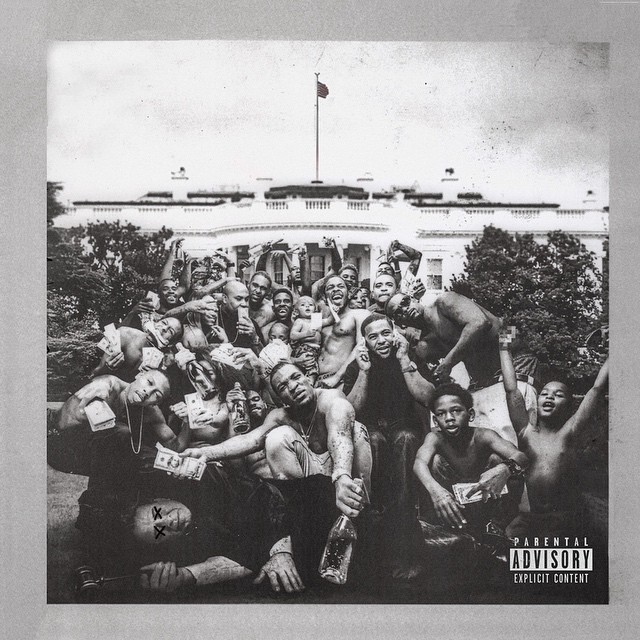The first time I
heard the grammy-winning single ‘I’, the song’s positive message immediately
clicked with me, but my alt-loving hipster side was apprehensive. Was Kendrick
about to go all radio-friendly? Was he going to sell out?
Thankfully, no. In fact, To
Pimp A Butterfly couldn’t be less radio-friendly if it tried. Set to a
backdrop of complex and jazzy Thundercat-and-Flylo-produced beats, Kendrick
mindfucks the listener (mindfuck
is now a verb), spinning an intricate web of lyrical metaphors and clever
contradictions, rapping in flows that vary from loose spoken word (‘For Free’) to
verses so tight and bouncy they rival Big KRIT (‘Alright’).
The Compton artist’s last record, Good Kid M.A.A.D City, saw him showing off his storytelling skills,
delivering the tale of a young man trying to make his way in the world whilst
dealing with girl problems, peer pressure from his homies and an impatient dad
who really wanted his Dominoes pizza. This time K-dot puts on his mortarboard
and exchanges the storytelling for poetry. Running through the entire album is
a single poem that Kendrick slowly reveals between tracks. This poem centres
around the exchange of ignorant arrogance and insecurity for positive self-love
and confidence – a theme that runs through the entire record.
Alas, Kendrick also proves himself to be a philosopher. The
first tracks all deal with ignorant arrogance and insecurity. There are tracks
like ‘Wesley’s Theory’ about using women for sex and tracks like ‘U’, a bitter
and uncomfortable serving of self-loathing. Later, we get tracks which
represent finding oneself and reaching enlightenment – ‘I’ being the most
prominent one. Race also plays a key theme throughout the record – Kendrick
giving us the beautiful hook ‘complexion
don’t mean a thing’, the angry attack on racial violence and black
hypocrisy ‘The Blacker the Berry’ and an eye-opening description of why it’s
acceptable for the black community to use the word ‘n***a’ as it derives from the old Ethipian word ‘negus’ meaning king.
This all ties in with the main theme of self-love – as well
as promoting that we all take pride in ourselves, Kendrick is also promoting
black pride throughout this record. Not the ignorant white-hating kind that we
sadly have all come to associate black pride with either, but a more positive
cultural embrace.
Clearly, there’s a lot of seriousness and depth on this
record. However, unlike some rappers who can sometimes take things to preachy
extremes, Kendrick knows how to keep his music philosophical but still fun. One
of his party-tricks used on this album is his talent for method acting. Instead
of preaching his messages from the perspective of himself, he often uses
characters to portray his viewpoints. ‘U’ sees him playing a drunken
depressive, whilst ‘The Blacker the Berry’ sees him portraying a frustrated hypocritical
black militant.
In each case, Kendrick goes the extra mile adopting not just
the persona but the tone of voice of that particular character. ‘The Blacker
The Berry’ sees him spitting his bars out more angrily than Ice Cube, whilst
‘U’ sees him sobbing into the mic like a broken man. This makes his music both
more emotive and entertaining than your usual monotone emcee. In fact, Kendrick
barely ever uses the same voice twice on this record, constantly shifting his
pitch and intonation from one song to the next in a schizophrenic fashion.
On my first listen, some the whacky voices did strike me as
slightly over-theatrical/annoying particularly the ‘This dick ain’t freeee’ part in ‘For Free’ and the ‘boo boo’ parts in ‘Hood Politics’.
Repeat listens have made me loosen up and appreciate the humour in these parts, a humour that’s
needed to counterbalance the profound solemnity of other parts of the album. The
creativity of these multiple voices is also impressive.
This is after all a very creative album and Kendrick takes
every chance to throw a new idea out there that hasn’t been done before. The
slowly-revealed poem running through the record is one of the most ingenious of
these ideas, but the real piece de resistance comes in the form of the twist at
the end of the record. The listener realises the whole time that Kendrick has
been reciting this poem to surprise guest star, Tupac Shakur. Adding to his talents as rapper, storyteller,
poet, philosopher and method actor, Kendrick proves at this point that he is
also a psychic medium, inviting the
listener into an interview between him and the deceased rap legend.
Clearly, Kendrick is aware that he is an influential figure,
but by featuring this interview he is also showing us that he too has people
who inspire him. It ties in with the idea of positive self-love – as much as it
is important to respect oneself, it’s also important to respect other people,
no matter how successful you are. Unlike the Madonnas and Kanyes of this world
that see themselves as the second coming of Christ, Kendrick realises his influence on the world but still sees himself as a
human being and this is what makes him and this album all the more likable.
‘If I respect you, we
unify and stop the enemy from killing us. But I don’t know, I’m no mortal
man, maybe I’m just another n***a.’
★★★★★
TRACK TASTER:



